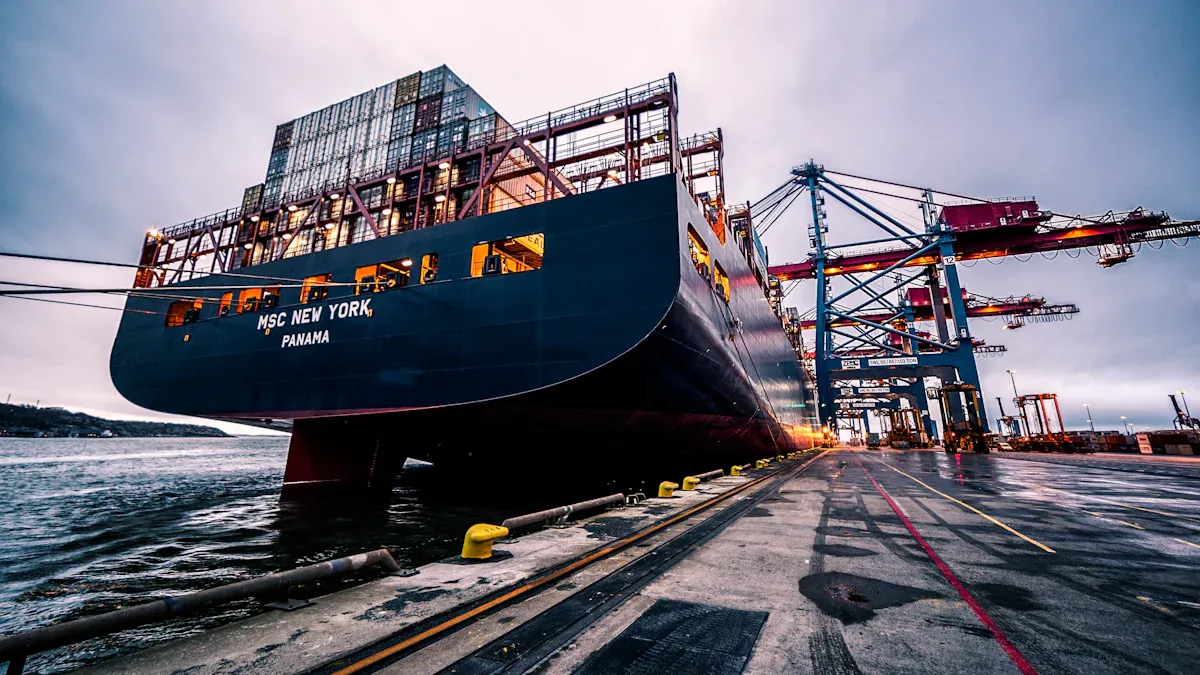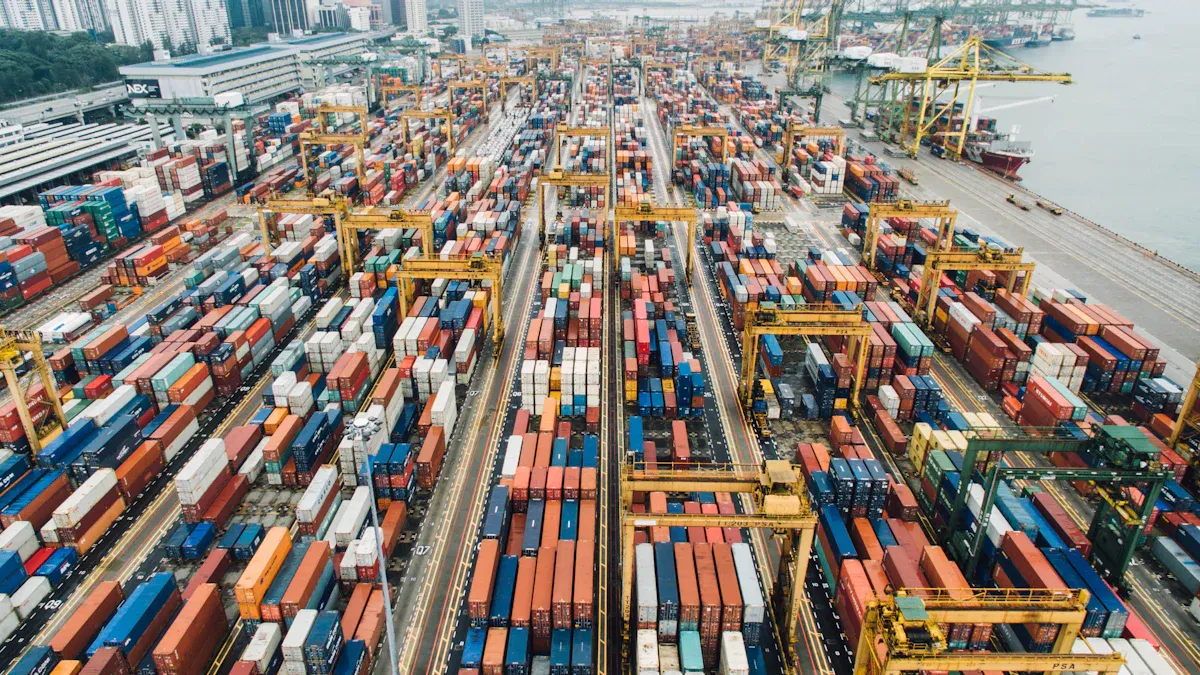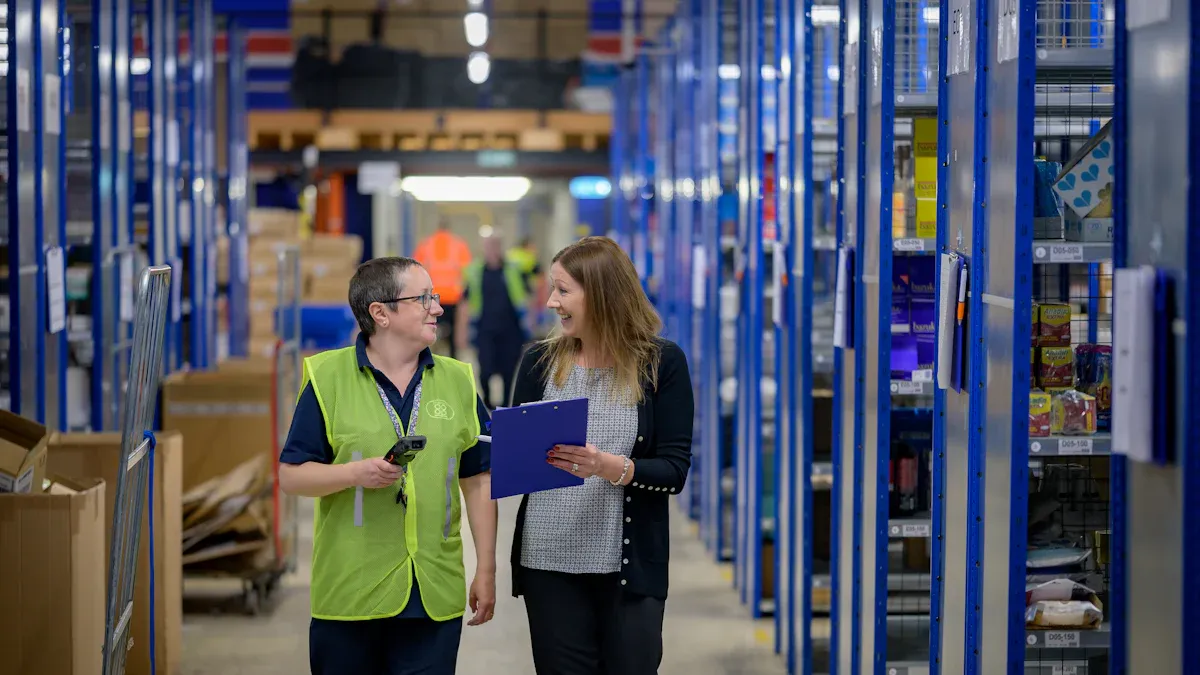What Does a Logistics Company Do for Your Business

When you ask what does a logistics company do for businesses, you get clear answers. Logistics companies plan, move, and control goods, services, and information across your supply chain. You rely on them for transportation, storage, warehousing, inventory management, order processing, and technology support.
You gain better efficiency because logistics experts optimize routes and manage inventory.
You save money and build trust with customers through fast deliveries and accurate orders.
Advanced logistics management software helps you track shipments and analyze supply chain data in real time. This gives you quick solutions and a strong advantage in the market.
Key Takeaways
Logistics companies enhance efficiency by optimizing routes and managing inventory, leading to faster deliveries and reduced costs.
Advanced technology, like real-time tracking and data analytics, helps businesses make informed decisions and improve customer satisfaction.
Outsourcing logistics can save businesses significant money, with many companies reporting annual savings of 15% to 20%.
Strong partnerships with logistics providers allow businesses to scale operations easily and respond quickly to market changes.
Choosing the right logistics partner involves assessing their experience, technology use, and ability to meet your business needs.
What Does a Logistics Company Do for Businesses

When you want to know what does a logistics company do for businesses, you see that these companies handle many important tasks. They plan, move, and control goods, services, and information. You get help with transportation, warehousing, inventory, and order processing. Each service makes your supply chain stronger and more reliable.
Planning and Coordination
You need strong planning and coordination to keep your supply chain running smoothly. Logistics companies work with you and your partners to match activities and optimize inventory. They use transparent communication to share inventory levels, demand forecasts, and production schedules. This helps everyone respond quickly to market changes.
You benefit from collaborative planning and forecasting. Partners analyze market trends and demand patterns together.
Synchronized production, warehousing, and transportation processes increase efficiency.
Real-time data sharing tools help you make fast decisions.
Tip: Good planning eliminates bottlenecks and reduces costs. You see timely deliveries and better product availability.
Transportation
Transportation is a key part of what does a logistics company do for businesses. You rely on logistics experts to move goods safely and quickly. They use Transportation Management Systems (TMS) to control shipments and provide data-driven insights. These systems help you track shipments and manage compliance with regulations.
Logistics companies use low-emission vehicles and smart packaging to lower costs and protect the environment.
They integrate warehouse operations and follow the latest rules.
Advanced technology like AI and IoT improves oversight and management.
Blockchain adds transparency and reduces risks.
You get on-time deliveries and fewer mistakes. Your customers trust you because their orders arrive when expected.
Warehousing
Warehousing answers another part of what does a logistics company do for businesses. You need safe places to store your products. Logistics companies offer dry storage and refrigerated storage solutions. Top providers include DHL Supply Chain, XPO, Ryder, GEODIS, NFI, Americold, and FedEx Logistics for dry storage. For refrigerated storage, you can choose Lineage Logistics, Americold, United States Cold Storage, XPO, VersaCold, and Interstate Warehousing.
You get help managing warehouse staff and space.
Logistics experts handle material and packaging.
They optimize picking and packing processes for speed and accuracy.
Your products stay safe and ready for delivery.
Inventory Management
Inventory management is a big part of what does a logistics company do for businesses. You need to know what you have and where it is. Logistics companies use advanced technology for real-time visibility. They analyze data to forecast demand and spot trends.
Automation powered by AI helps you keep the right amount of stock and reduces errors.
Cloud-based collaboration lets you work with partners easily.
Demand-driven and lean inventory practices keep costs low.
You avoid stockouts and overstock. Your business runs smoothly and you save money.
Order Processing
Order processing shows how logistics companies help you deliver fast and accurate service. They automate tasks like label generation, carrier selection, and order routing. This reduces delays and manual mistakes.
Fast-moving products are placed close to packing stations for quick access.
Intelligent batching lets workers pick many orders in one trip.
Logistics companies work with reliable carriers for on-time delivery and real-time tracking.
Flexible shipping options meet different customer needs.
They study past sales and seasonal trends to predict demand.
Staffing and stock levels are prepared ahead of time to avoid backlogs.
Note: Efficient order processing means your customers get their orders quickly and correctly.
Technology and Optimization

Tracking and Visibility
You want to know where your shipments are at all times. Logistics companies use advanced technology to give you real-time tracking and visibility. Tools like the Internet of Things (IoT) let you see the exact location and condition of your goods. You get updates on your shipments, which helps you keep your customers informed.
Real-time tracking improves customer satisfaction because clients know when to expect their orders.
You solve problems quickly, such as delays or lost shipments.
Increased transparency helps you make better decisions for your business.
Tip: Tracking tools help you spot issues before they become big problems. You can act fast and keep your supply chain running smoothly.
Route Optimization
You save time and money when logistics companies use route optimization software. This technology finds the best delivery routes using real-time data and traffic conditions. You deliver products faster and use less fuel, which helps the environment.
Impact Area | Description |
|---|---|
Cost Reduction | Reduces operational costs by minimizing fuel consumption and extra mileage. |
Delivery Speed | Enhances delivery speed by optimizing routes based on real-time data and traffic conditions. |
Sustainability | Lowers carbon footprint through efficient route planning, contributing to environmental goals. |
Customer Satisfaction | Increases customer satisfaction by ensuring timely deliveries and improving overall service. |
You can increase your delivery capacity without adding more vehicles. Route optimization software can reduce delivery time by up to 30%. Logistics companies also use electric and hybrid vehicles, which lower emissions and support green logistics.
Data and Analytics
You get smarter supply chain decisions with data and analytics. Logistics companies use artificial intelligence (AI), big data, and predictive analytics to manage inventory and forecast demand.
Data analytics helps you keep the right amount of stock and avoid running out.
You identify risks with suppliers and take action before problems happen.
Real-time monitoring lets you fix issues quickly.
Predictive analytics helps you plan production schedules and improve efficiency.
You find the best delivery routes using data-driven insights.
You see the latest trends in logistics technology, such as robotics in warehouses, blockchain for secure transactions, and automation for faster operations. These advancements show what does a logistics company do for businesses in today’s fast-paced market.
Note: Data-driven decision-making gives you a strong advantage. You can measure performance, track key metrics, and improve your supply chain every day.
Business Benefits
Cost Savings
You can save a lot of money by working with a logistics company. Outsourcing logistics helps you avoid big investments in trucks, warehouses, and staff. Many businesses save between 15% and 20% on logistics costs each year. Some companies report total annual savings of up to $455,000. Logistics providers combine shipments and use smart route planning software to lower transportation costs. They also negotiate discounts with carriers, which means you pay less for shipping.
You reduce expenses for storage and transportation.
You avoid spending money on extra equipment and facilities.
You benefit from economies of scale.
Tip: Most Fortune 500 companies use third-party logistics providers to cut costs and stay competitive.
Efficiency
Logistics companies help you work faster and smarter. They use advanced technology to track shipments and manage inventory. You get real-time updates, so you always know where your products are. Automation and smart systems make order processing quick and accurate.
You save time by letting experts handle complex supply chain tasks.
You improve resource use and productivity.
You get faster delivery times, which keeps your customers happy.
Efficiency Benefit | Description |
|---|---|
Faster Deliveries | Advanced routing reduces delivery times. |
Better Inventory Control | Real-time tracking prevents stockouts. |
Improved Productivity | Automation boosts output and accuracy. |
Scalability
You can grow your business easily with the help of a logistics company. Flexible infrastructure lets you adjust operations during busy seasons or slow periods. You do not need to worry about hiring extra staff or renting more space. Logistics providers offer on-demand warehousing and temporary labor, so you can handle more orders when needed.
You respond quickly to changes in demand.
You avoid delays by using real-time tracking and data sharing.
You use automation to handle more shipments without mistakes.
Note: Scalability helps you stay ahead of competitors and manage growth without stress.
Customer Satisfaction
Your customers expect fast and reliable service. Logistics companies help you meet these expectations by delivering orders on time and providing real-time tracking. Over 65% of people now expect better customer service than they did a few years ago. When you keep customers happy, you build loyalty and increase profits. Research shows that a 5% increase in customer retention can boost profits by over 25%.
You offer timely deliveries and clear updates.
You provide responsive support and transparency.
You create a seamless experience that keeps customers coming back.
Callout: Happy customers help your business grow and improve your reputation.
Choosing a Logistics Partner
What to Look For
You want a logistics partner who matches your business needs. Look for experience in your industry. Check if they use advanced technology like AI or IoT for tracking and managing shipments. Make sure they can grow with your business and handle busy seasons. Review their financial stability to avoid risks. Ask about their sustainability efforts. Good customer service and clear communication matter for a strong partnership.
Description | |
|---|---|
Industry Experience | Find partners with proven success in your field. |
Technology Integration | Look for AI, IoT, and other tools that improve tracking and efficiency. |
Scalability and Flexibility | Choose a provider who can adapt to your growth and changing needs. |
Financial Stability | Check revenue trends and credit ratings for long-term reliability. |
Sustainability Practices | Ask about eco-friendly initiatives in their operations. |
Customer Service Excellence | Expect clear communication and support throughout your partnership. |
Tip: Certifications show that a logistics company values employee skills and quality service. Many top companies require certifications for leadership roles.
Questions to Ask
You need to ask the right questions before signing a contract. This helps you avoid surprises and find the best fit.
Is your business model compatible with ours?
What experience do you have with shipments like ours?
What regions do you serve? Do you have a global network?
What technologies and monitoring systems do you use?
Are your warehouse locations suitable and do they have enough capacity?
What services do you offer?
How do you approach sustainability?
What insurance coverage do you provide?
Can you share case studies from our industry?
What is your pricing structure?
What performance metrics do you track?
Can you scale with our business?
Callout: Asking these questions helps you avoid risks like hidden costs, loss of control, or poor service quality.
Getting Started
You can start by identifying areas in your logistics that need improvement. Build expertise in a niche if you want to stand out. Use technology to automate tasks and keep costs low. Pay attention to legal requirements and get the right licenses. Open a business account and secure financing. Decide if you need your own fleet or want to work with carriers. Hire skilled drivers and warehouse staff. Set competitive pricing for your services.
Bootstrapping lets you use personal resources or profits.
Venture capital can help if you plan to grow quickly.
Bank loans, like SBA loans, offer good terms for new businesses.
Note: Start small and grow as you learn what does a logistics company do for businesses. This helps you build a strong foundation and avoid common mistakes.
Logistics companies help your business grow by making your supply chain faster and more reliable. You see new delivery models and better technology, which keep your customers happy. Strong partnerships open new markets and improve teamwork.
Key Takeaway | Description |
|---|---|
Importance of Speed | Same-day pricing speeds up decisions and processes. |
Transparency and Communication | Clear updates build trust and improve relationships. |
Strengthened Customer Relationships | Fast, reliable service increases loyalty. |
Competitive Pricing | Quick action helps you meet more demand. |
Unified Team | Efficient work boosts morale and reduces stress. |
Take time to review your logistics needs. A trusted partner can help you reach your business goals.
FAQ
What is a logistics company?
A logistics company helps you move, store, and manage products. You get support with shipping, warehousing, and tracking. These experts make your supply chain work better.
How does a logistics company save you money?
You save money because logistics companies use smart planning and technology. They combine shipments, find better routes, and negotiate lower rates. You avoid buying trucks or renting warehouses.
Can a logistics company help you grow your business?
Yes, you can grow faster with a logistics partner. You handle more orders during busy times. You use flexible storage and quick shipping. This helps you reach new customers.
What technology do logistics companies use?
You see logistics companies use tracking tools, route optimization software, and data analytics. These tools help you follow shipments, plan deliveries, and manage inventory.
How do you choose the right logistics company?
You look for experience, strong technology, and good customer service. You check if they can grow with your business. You ask about their safety record and sustainability efforts.
See Also
Understanding B2B Warehousing and Distribution on the East Coast
Accelerate Your Orders with PGL Warehousing in NJ and FL
PGL's Miami Warehouse Solutions for Quick East Coast Shipping
Optimizing Import Warehousing and Delivery on the East Coast
Reasons Southern California eCommerce Brands Prefer PGL Warehousing
